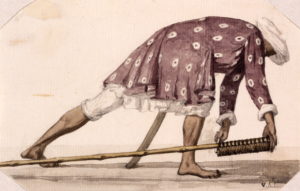Indian Inventions that Changed the Modern World

Team Hindi
Bharat has been the home of genius inventions since the very beginning of time. In today’s world of global competition, our motherland’s inventions have created buzz in the world and have carved a new path for it to follow.
Right from the days of Aryabhatta’s invention of zero to the cure of cancer today, Indians have made a mark in every field and continue to do so even today.
In the timeline of India’s history, several inventions have not be attributed to their rightful inventors and this has led to people forgetting our rich culture of inventiveness, scientific inquiry and innovation. You might also be under the mistaken assumption that we haven’t contributed any life-changing inventions to the world since ancient times, but the following scientists have proven that India’s Innovative culture is very much alive and thriving.
Let’s have a look at some of the most amazing inventions by Indians:
USB:
A highly recognizable invention but an unsung inventor, USB is the most widely used by people all over the world. This invention standardized the devices so that they could connect to each other and exchange data. Very few people know about Ajay Bhatt, the inventor responsible for Universal Serial Bus. It was developed by him and his team at Intel and it has revolutionized everyone’s lives by creating a standard interface.
Mysorean Rockets:
This fact may surprise you, but Rockets which were iron tipped and metal body were first developed by Tipu Sultan and his father Hyder Ali to be used against the British East India Company. Ingeniously, the propellants were stored in the metal body which gave it long range and higher power. It was a far more advanced technology than the British had ever seen, and afterwards was adapted by them to be used to defeat Napolean.
Chandrashekher Limit:
Chandrashekher limit is the maximum mass of a stable white dwarf star. Beyond this limit, the white dwarf star collapses. At the age of 20, S. Chandrashekher had improved the calculation of this number and hence, the limit was named after him. S. Chandrashekher was an Indian born physicist who won the Nobel Prize in 1938 for his research in stellar evolution. His findings on the mathematics of stellar evolution has lead to many later theories around the stars of our universe.
Quantum statistics:
A huge contribution to one of the most complicated subject on the planet, is Quantum Statistics. The discovery of this field turn lead to describing of the boson particles which are named after An Unsung hero of physics, S.N. Bose. S.N. Bose is the pioneer who is the father of quantum statistics. Only when Einstein recognized the genius of S.N. Bose’s research, was it published in a journal. Before that he had faced rejection of his research by other scientists.
Pentium Microprocessors:
Pentium Microprocessors which were at one point associated with every computer were invented by a revolutionary scientist, Vinod Dham, also known as the father of Pentium chip. Intel’s Pentium was at one point a part of every CPU and increased the processing speed and reduced the size. This was an extremely important invention which opened new doors for technology.
Wootz Steel:
India in the ancient times was a pioneer in Metallurgy and even to this day it is a metallurgy hub especially because of the production of the finest quality steel, Wootz Steel. It’s useful properties astonished traders from Rome, Greece and China who considered it so valuable that at one point, instead of gold, Alexander the great was given steel by King Porus. It is carbeurised steel also called crucible steel. It was developed in Southern India. Wootz Steel is still the backbone of almost all industries even today.
Optical Fiber:
Another highly used invention which revolutionized the communication world, optical fibers have replaced metal wires and cause very little transmission loss. It is widely used in networking and telecommunication because of its flexible properties. It is the reason why we have such advancement in internet speed today. Again very few people know that they were invented by an Indian scientist, Narinder Singh Kapany. He is known as the father of Fibre optics who also coined the term “fibre optics” himself.
Lunar water:
The discovery of water on Moon is perhaps the most iconic space discovery made in the recent years and it is all thanks to our scientists at ISRO. Based on data recovered by Chadrayaan I, the scientists confirmed discovery in 2009. NASA has thanked India’s contribution in making this important discovery possible.
Indian inventions have been changing the world without our acknowledgement for years. Let us all celebrate our Country’s great hand in revolutionizing the world with innovation by spreading word of our achievements and also contributing our ideas for the betterment of the world.
Jai Hind!












27 Comments
stromectol 6mg – buy tegretol 200mg pill carbamazepine price
accutane 10mg sale – order zyvox 600 mg linezolid 600mg without prescription
where can i buy amoxil – buy combivent 100mcg generic combivent usa
zithromax cheap – cheap zithromax 500mg buy bystolic
prednisolone 5mg generic – buy azipro for sale progesterone usa
buy neurontin 800mg generic – purchase anafranil online itraconazole for sale online
purchase lasix pill – buy furosemide 40mg pills buy generic betnovate 20gm
purchase vibra-tabs – order glucotrol 5mg pills order generic glipizide 10mg
augmentin order online – cymbalta 40mg brand buy cymbalta paypal
order augmentin 625mg pills – cost nizoral buy generic cymbalta 20mg
order rybelsus 14 mg generic – order semaglutide 14 mg without prescription cyproheptadine us
zanaflex for sale – hydrochlorothiazide for sale purchase hydrochlorothiazide generic
tadalafil 10mg tablet – order cialis for sale viagra next day delivery
buy viagra 50mg generic – order viagra for sale cialis us
cenforce 50mg ca – chloroquine pills glucophage 1000mg usa
omeprazole 10mg price – prilosec pills generic atenolol 100mg
misoprostol pills – orlistat 60mg price buy diltiazem 180mg sale
zovirax 400mg for sale – cheap zovirax 400mg crestor for sale
buy motilium paypal – purchase motilium pills order cyclobenzaprine pills
domperidone price – motilium where to buy flexeril canada
inderal online – order methotrexate 10mg sale buy methotrexate 2.5mg without prescription
purchase warfarin generic – purchase reglan losartan 50mg sale
order levaquin 250mg pill – order generic levofloxacin oral zantac
cost esomeprazole – purchase topamax online imitrex 50mg canada
buy generic meloxicam – flomax online flomax 0.2mg brand
zofran for sale – aldactone buy online buy zocor cheap
valacyclovir uk – valtrex pill diflucan sale